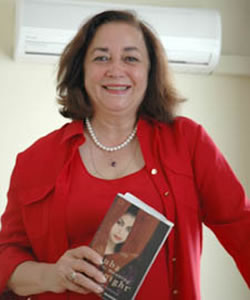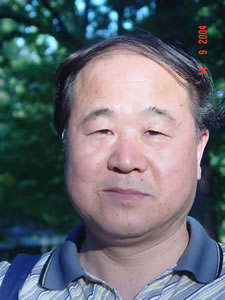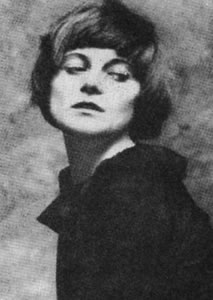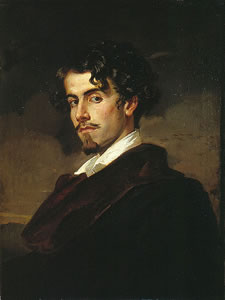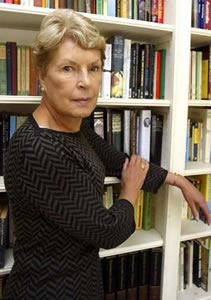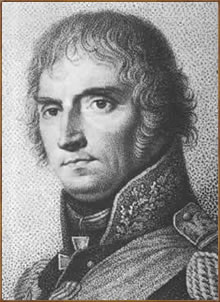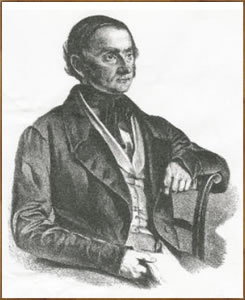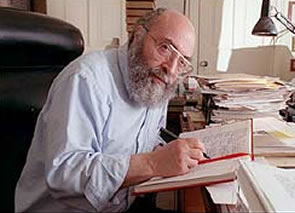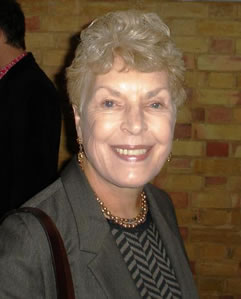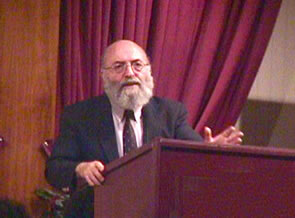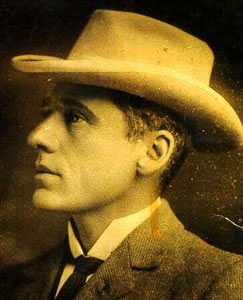De Amerikaanse dichter Jack Gilbert werd geboren in Pittsburgh op 17 februari 1925. Zie ook alle tags voor Jack Gilbert op dit blog.
The Forgotten Dialect Of The Heart
How astonishing it is that language can almost mean,
and frightening that it does not quite. Love, we say,
God, we say, Rome and Michiko, we write, and the words
get it all wrong. We say bread and it means according
to which nation. French has no word for home,
and we have no word for strict pleasure. A people
in northern India is dying out because their ancient
tongue has no words for endearment. I dream of lost
vocabularies that might express some of what
we no longer can. Maybe the Etruscan texts would
finally explain why the couples on their tombs
are smiling. And maybe not. When the thousands
of mysterious Sumerian tablets were translated,
they seemed to be business records. But what if they
are poems or psalms? My joy is the same as twelve
Ethiopian goats standing silent in the morning light.
O Lord, thou art slabs of salt and ingots of copper,
as grand as ripe barley lithe under the wind’s labor.
Her breasts are six white oxen loaded with bolts
of long-fibered Egyptian cotton. My love is a hundred
pitchers of honey. Shiploads of thuya are what
my body wants to say to your body. Giraffes are this
desire in the dark. Perhaps the spiral Minoan script
is not laguage but a map. What we feel most has
no name but amber, archers, cinnamon, horses, and birds
In Dispraise Of Poetry
When the King of Siam disliked a courtier,
he gave him a beautiful white elephant.
The miracle beast deserved such ritual
that to care for him properly meant ruin.
Yet to care for him improperly was worse.
It appears the gift could not be refused.

Jack Gilbert (17 februari 1925 – 13 november 2012)
De Duitse dichteres, schrijfster en caberetiere Emmy Hennings werd geboren op 17 februari 1885 in Flensburg. Zie ook alle tags voor Emmy Hennings op dit blog.
Uit: Das Brandmal
„Im Namen des Namenlosen will ich beginnen, obgleich ich mich so weit von ihm entfernt fühle. Gerade aus diesem Grunde: in seinem Namen. Das Namenlose ist die erste und letzte Ursache meines Daseins. Ich ahne es als die Ursache des Daseins aller Menschen. Das ist nur meine gläubige Vermutung, sonst nichts. Ich aber will über meine eigene Ursache sinnen, über mich, denn ich bin noch nicht über mich hinausgekommen.
Ich sehe ja immer nur mit meinen eigenen Augen. Ich darf mich nicht darüber täuschen und sagen, ich sähe mit den allgemeinen Augen. Ich glaube nicht, daß jemand seine persönlichen Augen bei Lebzeiten auswechseln kann.
Das Verlangen, alles umfassen zu wollen, ist eine Sucht, nur meine Sehnsucht, sonst nichts. In Wahrheit aber kann ich nichts mehr begreifen, nichts halten, nichts fassen. Es ist, als löse sich alles.
Wie lange doch hat es gedauert, bis ich dahin gekommen bin, mir eines Tages einzugestehen: ich bin ein ungeordneter Mensch.
Hat mich ein Fall, ein Zufall verführt zum Bekenntnis? Mein Gott ist kein Zufall. Die Ewigkeit kann ich nicht Zufall nennen. Und doch war mir, als sei der Zufall mein Schicksal geworden.
Der Zufall kann wohl kein Grund zu einer Umwälzung sein. Es gibt so viele Zufälle.
Ich bin eine Frau. Ich hebe die Kontrolle auf. Die Frage nach dem »Warum« und »Woher«.
Ich gestehe nur das »Wie«.
Wie war es?
Jeder Anlaß war mir ein Abgrund, ich bin nicht erst heute gefallen. Erst heute merke ich, daß ich immer gefallen bin. Jetzt aber, da ich unten bin, – vielleicht kann ich nicht tiefer kommen –, sehe ich: ich bin gefallen. Meine Geburt war der Fall eines Engels, der von Gott abfiel, und jetzt suche ich wieder …
Um die Gegenwart zu erhellen, gedenke ich der Vergangenheit. Die Erinnerung lebt in mir, nach Tagen, Monaten, Jahren, immer. So ist es und wird es sein. Die Tatsachen, wie man die sichtbaren Handlungen in der Welt nennt, sind belanglos geworden. Nur das geistige Erleben und Wiedererleben rollt weiter. Nur die empfindsame Illusion ist es. Denn wenn ich vollkommen erleben könnte, wäre ich da nicht bei der ersten Begegnung mit dem ersten Erlebnis geblieben? Zusammengebrochen? Das Leben hat mich wohl nur gestreift, berührt. Daß man das Leben überleben kann! Wie schmerzhaft und empfindsam bin ich jetzt stecken geblieben! Stecke ich im Leben? Was meine Augen gesehen haben, hat mir nicht so weh getan, als was mein Herz, oder was immer es sein mag, fühlt.“

Emmy Hennings (17 februari 1885 – 10 augustus 1948)
Cover
De Japanse schrijver Mori Ōgai werd geboren op 17 februari 1862 als Mori Rintaro in het dorpTsuwano in Iwami. Zie ook alle tags voor Mori Ōgai op dit blog.
Uit: The Dancing Girl (vertaald door Richard Bowring)
“But it is so deeply engraved upon my heart that I fear this is impossible. And yet, as there is no one here this evening, and it will be some while before the cabin boy comes to turn off the light, I think I will try to record the outline of my story here. Thanks to a very strict education at home since childhood, my studies lacked nothing, despite the fact that I lost my father at an early age. When I studied at the school in my former fief, and in the preparatory course for the university in Tokyo, and later in the Faculty of Law, the name Ota Toyotaro was always at the top of the list. Thus, no doubt, I brought some comfort to my mother who had found in me, her only child, the strength to go through life. At nineteen I received my degree and was praised for having achieved greater honor than had any other student since the founding of the univer-sity. I joined a government department and spent three pleasant years in Tokyo with my mother, whom I called up from the country. Being especially high in the estimation of the head of my department, I was then given orders to travel to Europe and study matters connected with my particular section. Stirred by the thought that I now had the opportunity to make my name and raise my family fortunes, I was not unduly sorry to leave even my mother, although she was over fifty. So it was that I left home far behind and arrived in Berlin. I had the vague hope of accomplishing great feats and was used to work-ing hard under pressure. But suddenly here I was, standing in the middle of this most modern of European capitals. My eyes were dazzled by its bril-liance, my mind was dazed by the riot of color. To translate Unter den Lin-den as “under the Bodhi tree” would suggest a quiet secluded spot. But just come and see the groups of men and women sauntering along the pave-ments that line each side of that great thoroughfare as it runs, straight as a die, through the city. It was still in the days when Wilhelm I would come to his window and gaze down upon his capital. The tall, broad-shouldered officers in their colorful dress uniform, and the attractive girls, their hair made up in the Parisian style, were everywhere a delight to the eye. Car-riages ran silently on asphalt roads. Just visible in the clear sky between the towering buildings were fountains cascading with the sound of heavy rain. Looking into the distance, one could see the statue of the goddess on the vic-tory column. She seemed to be floating halfway to heaven from the midst of the green trees on the other side of the Brandenburg Gate. All these myriad sights were gathered so close at hand that it was quite bewildering for the newcomer.”

Mori Ōgai (17 februari 1862 – 9 juli 1922)
Plaquette voor een hotel in Tokyo
De Spaanse dichter Gustavo Adolfo Bécquer werd op 17 februari 1836 in Sevilla geboren. Zie ook alle tags voor Gustavo Adolfo Bécquer op dit blog.
The Siren
A momentary indiscretion,
And the vision of your fluttering lids
Is burned forever in my mind
Like a dark spot, edged in fire,
For staring at the sun.
Now, wherever I look,
I’m haunted by those flaring pupils,
But it’s only your afterimage, not you,
Your sunspot eyes and nothing more.
Alone in my room, I stare
At the ceiling and try to forget,
But even when I sleep, I feel your phantom gaze,
Doe-eyed and fluttering.
I know there are things in the night
That call unwary dreamers to their doom.
Still, I am drawn to you,
To your eyes edged in fire,
Though where they lead I do not know.
The viewless atoms of the air
The viewless atoms of the air
Around me palpitate and burn,
All heaven dissolves in gold, and earth
Quivers with new-found joy.
Floating on waves of harmony I hear
A stir of kisses, and a sweep of wings;
Mine eyelids close–“What pageant nears?”
“‘Tis Love that passes by!”
Vertaald door Walter Wykes

Gustavo Bécquer (17 februari 1836 – 22 december 1870)
Daniel Migueláñez alsGustavo Bécquer in het theaterstuk ‘El círculo de Hierro’, Madrid, 2018
De Duitse dichter en schrijver Georg Britting werd op 17 februari 1891 geboren in Regensburg. Zie ook alle tags voor Georg Britting op dit blog.
Frühling im Alpenvorland
Nun erblühen schon die Weidenzweige
Und der Mond war gestern rot umraucht
Und im Wald die aufgetauten Steige
Warten darauf, daß man sie gebraucht.
Dieses Licht! Wer fände leicht die Worte,
So es zu benennen, wie es ist?
Bergher kommts! Vom hochgelegnen Orte!
Schön zu sehen, wie es abwärts fließt,
Wie das Wasser rinnt aus einer Quelle,
Ihr vertrauend, stetig, ohne Hast,
Bis im Tal die letzte finstre Stelle
Hell wie Gold wird. Diese schämt sich fast.
Alt-neue Freudigkeit
Die Pappel steht. Man sieht es ihr nicht an,
Daß sie den Frühling spürt, und wie er tut!
Ein bißchen Grün ists, was sie zeigen kann.
Unsichtbar steigt in ihr das junge Blut.
Die Wolke geht. Ihr sieht mans eher an,
Daß sie es fühlt: nun rührt es sich mit Fleiß!
Weiß weht sie hin. Man denkt an einen Schwan
Auf blauem See – zerschmolzen ist sein Eis!
Es schmolz vor kurzem erst. Wer denkt noch dran?
So schnell ist das Vergessen? O der Zeit!
Nun streicht ein neuer Wind an uns heran.
Ein neuer der? Alt–neue Freudigkeit,
Die kommt und geht! Und schau die Pappel an!
Im Vorjahr war es mit ihr ebenso:
Erst kahl im März! Dann laubig! Und ein Mann!
Im grünen Kornhalm wispert schon das Stroh!

Georg Britting (7 februari 1891- 27 april 1964)
De Australische dichter Andrew Barton “Banjo” Paterson werd geboren op 17 februari 1864 in Narambla in New South Wales. Zie ook alle tags voor Andrew Paterson op dit blog.
The Stockman
A bright sun and a loosened rein,
A whip whose pealing sound
Rings forth amid the forest trees
As merrily forth we bound
As merrily forth we bound, my boys,
And, by the dawn’s pale light,
Speed fearless on our horses true
From morn till starry night.
“Oh! for a tame and quiet herd,”
I hear some crawler cry;
But give to me the mountain mob
With the flash of their tameless eye
With the flash of their tameless eye, my boys,
As down the rugged spur
Dash the wild children of the woods,
And the horse that mocks at fear.
There’s mischief in you wide-horned steer,
There’s danger in you cow;
Then mount, my merry horsemen all,
The wild mob’s bolting now
The wild mob’s bolting now, my boys,
But ’twas never in their hides
To show the way to the well-trained nags
That are rattling by their sides.
Oh! ’tis jolly to follow the roving herd
Through the long, long summer day,
And camp at night by some lonely creek
When dies the golden ray.
Where the jackass laughs in the old gum tree,
And our quart-pot tea we sip;
The saddle was our childhood’s home,
Our heritage the whip.

Andrew Paterson (17 februari 1864 – 5 april 1941)
Cover
De Amerikaanse schrijfster Margaret Truman werd geboren op 17 februari 1924 in Independence, Missouri. Zie ook alle tags voor Margaret Truman op dit blog.
Uit: The President’s House
“Perhaps the most intriguing White House denizens are the men and women who have worked beside presidents as their spokespersons or confidential advisers. More than anyone, they often shared the reflected glow of White House power. Not all of them were able to deal with it rationally or responsibly, though the vast majority have managed it. For many of them, the experience was more than a little harrowing–and in a few cases, fatal.
I am thinking of one of my most heartbreaking White House memories–the death of my father’s boyhood friend and press secretary, Charlie Ross. Charlie went through high school with Harry Truman and went on to become a top-ranked Washington, D.C., reporter for the St. Louis Post-Dispatch. When my father turned to him for help in 1945, Charlie gave up a comfortable salary and rational hours for the ordeal of a White House in which clocks and sensible schedules ceased to exist. Five exhausting years later, during the frantic early months of the Korean War, when newsmen besieged the White House twenty-four hours a day, Charlie Ross collapsed and died of a heart attack at his desk. A weeping Harry Truman said the country had lost a great public servant–and he had lost his best friend.
That memory leads us to another cadre of White House inhabitants, although many presidents and their families might be reluctant to bestow that title on them: the men and women of the media. They, too, participate in the aura of the White House–to the point where they sometimes act as if they run the place. I had a vivid reminder of this mind-set when I came to the White House to talk with Hillary Clinton in 1994 about my book in progress, First Ladies.
A badly misinformed White House policeman told me to enter the mansion through the press briefing room in the West Wing. The minute I stepped through the doorway, a half dozen reporters surrounded me. Why was I there? To advise Hillary on how to improve her performance as First Lady? What did I think of Hillary’s latest hairstyle? Should she hold more press conferences ^ la Eleanor Roosevelt, or fewer ^ la Bess Truman (who held none at all)? I smiled sweetly and said “No comment” to these attempts to get me to put my foot in my mouth.”

Margaret Truman (17 februari 1924 – 29 januari 2008)
Cover
De Britse schrijfster Ruth Rendell werd geboren als Ruth Grasemann in Londen op 17 februari 1930. Zie ook alle tags voor Ruth Rendell op dit blog.
Uit: Harm Done
“If she had been, well, a different sort of girl, Wexford wouldn’t have paid so much attention. If she had been more like her friends. He hesitated about the phrase he used even in his own mind, for he liked to keep to his personal brand of political correctness in his thoughts as well as his speech. Not to be absurd about it, not to use ridiculous expressions like intellectually challenged, but not to be insensitive either and call a girl such as Lizzie Cromwell mentally handicapped or retarded. Besides, she wasn’t either of those things, she could read and write, more or less, she had a certain measure of independence and went about on her own. In daylight, at any rate. But she wasn’t fit just the same to be left alone after dark on a lonely road. Come to that, what girl was?
So he thought she was dead. Murdered by someone. What he had seen of Colin Crowne he hadn’t much liked, but he had no reason to suspect him of killing his stepdaughter. True, some years before he married Debbie Cromwell, Crowne had been convicted of assault on a man outside a pub, and he had another conviction for taking and driving away — in other words, stealing — a car. But what did all that amount to? Not much. It was more likely that someone had stopped and offered Lizzie a lift.
“Would she accept a lift from a stranger?” Vine had asked Debbie Crowne.
“Sometimes it’s hard to make her like understand things,” Lizzie’s mother had said. “She’ll sort of say yes and no and smile — she smiles a lot, she’s a happy kid — but you don’t know if it’s like sunk in. Do you, Col?”
“I’ve told her never talk to strangers,” said Colin Crowne. “I’ve told her till I’m blue in the face, but what do I get? A smile and a nod and another smile, then she’ll just say something else, something loony, like the sun’s shining or what’s for tea.”
“Not loony, Col,” said the mother, obviously hurt.
“You know what I mean.”
So when she had been gone three nights and it was the morning of the third day, Colin Crowne and the neighbors on either side of the Crownes on the Muriel Campden Estate started searching for Lizzie. Wexford had already talked to her friends and the driver of the bus she should have been on but hadn’t been on, and Inspector Burden and Sergeant Vine had talked to dozens of motorists who used that road daily around about that time. When the rain became torrential, which happened at about four in the afternoon, they called off the search for that day, but they were set to begin again at first light. Taking DC Lynn Fancourt with him, Wexford went over to Puck Road for another talk with Colin and Debbie Crowne.”

Ruth Rendell (Londen, 17 februari 1930)
Cover
De Russische dichter en schrijver Fjodor Sologoeb (eig. Fjodor Koezmitsj Teternikov) werd geboren in Sint-Petersburg op 17 februari 1863. Zie ook alle tags voor Fjodor Sologoeb op dit blog.
The Sacred World’s Unquestioned
The sacred world’s unquestioned Pharaoh –
I filled it with my spirit’s breath
And shall not ever have a hero
Nor in the heavens nor on earth.
I’ll hold in secret that I breed on
My own sacramental light;
And toil like slave, but for my freedom,
I call for darkness, peace and night.
I Composed These Rhythmical Sounds
I composed these rhythmical sounds
To make lesser the thrust of my soul,
And to draw the heart’s endless wounds,
In the sea where the silver strings roll,
To make sound, like nightingales’ ode,
My poor dream’s ever beautiful voice,
And to force the song’s smile from lips closed
And blazed on by long sadness and loss.

Fjodor Sologoeb (17 februari 1863 – 5 december 1927)
Zie voor nog meer schrijvers van de 17e februari ook mijn vorige blog van vandaag.









